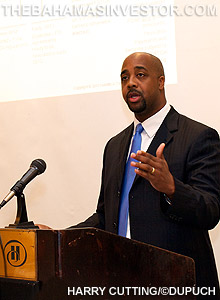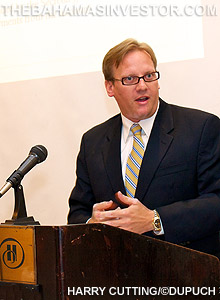| Source: Date: Updated: |
TheBahamasInvestor.com
Friday, February 17, 2012 Friday, February 17, 2012 |
 An event held on Wednesday this week at the Colonial Hilton in downtown Nassau detailed how financial institutions can comply with the newly created Financial Account Tax Compliance Act (FATCA) scheduled to become US law January 1, 2013.
An event held on Wednesday this week at the Colonial Hilton in downtown Nassau detailed how financial institutions can comply with the newly created Financial Account Tax Compliance Act (FATCA) scheduled to become US law January 1, 2013.
The Bahamas Institute of Financial Services (BIFS) sponsored the seminar.
FATCA is designed to prevent the abuse or avoidance of taxation on income earned by US persons, especially via offshore accounts in financial centres such as The Bahamas.
The law requires US taxpayers to report financial assets held outside the country to the IRS. Foreign financial institutions (FFIs) are required to enter into disclosure agreements with the US Treasury. Non-financial foreign entities (NFFIs) are also compelled to report client information on “substantial” US persons under this law.
Non-compliance by financial entities can result in a 30 per cent withholding tax on all US source income.
“FATCA is not going away,” cautioned Lawrence Lewis, Deloitte’s lead partner for the FATCA initiative for The Bahamas, and one of the seminar’s speakers. “Most institutions will need to comply because they have some exposure, however minor. It’s simply too risky not to.”
FATCA will impose several significant tax reporting, due diligence and tax payment obligations on financial institutions.
One of the key compliance challenges will be determining who is a “US person,” which is defined broadly under the act as anyone with either dual citizenship, US citizenship, a US passport holder, born in the US or is a permanent resident, among other criteria.
 Ryan Pinder, member of Parliament and Co-chair of the Committee on Foreign Relations and Foreign Trade, highlighted this concern in his remarks during the event.
Ryan Pinder, member of Parliament and Co-chair of the Committee on Foreign Relations and Foreign Trade, highlighted this concern in his remarks during the event.
“It will potentially be very difficult to identify some US persons, especially dual passport holders, who can easily open financial accounts with non-US passports,” he said. “The US government is putting this burden directly on you.”
Calling this legislation “vast and sweeping,” Pinder argued for more involvement of the Bahamian financial industry and government during the current “comments” period, when special interests can request exemptions and exceptions. The comments period ends in April.
“Let’s argue some exemptions for us,” he said. “That’s why we have lawyers.”
Also speaking was Tyrone Fitzgerald, general counsel for the Grand Bahama Port Authority of Freeport, Grand Bahama. He stressed that institutions need to develop their own “FATCA task forces” now, so they can stay current with the inevitable changes.
Referring to a compliance timetable, he said: “Begin now or you’ll be left way behind. Don’t wait until the ink’s dry on FATCA.”
hcutting@dupuch.com











